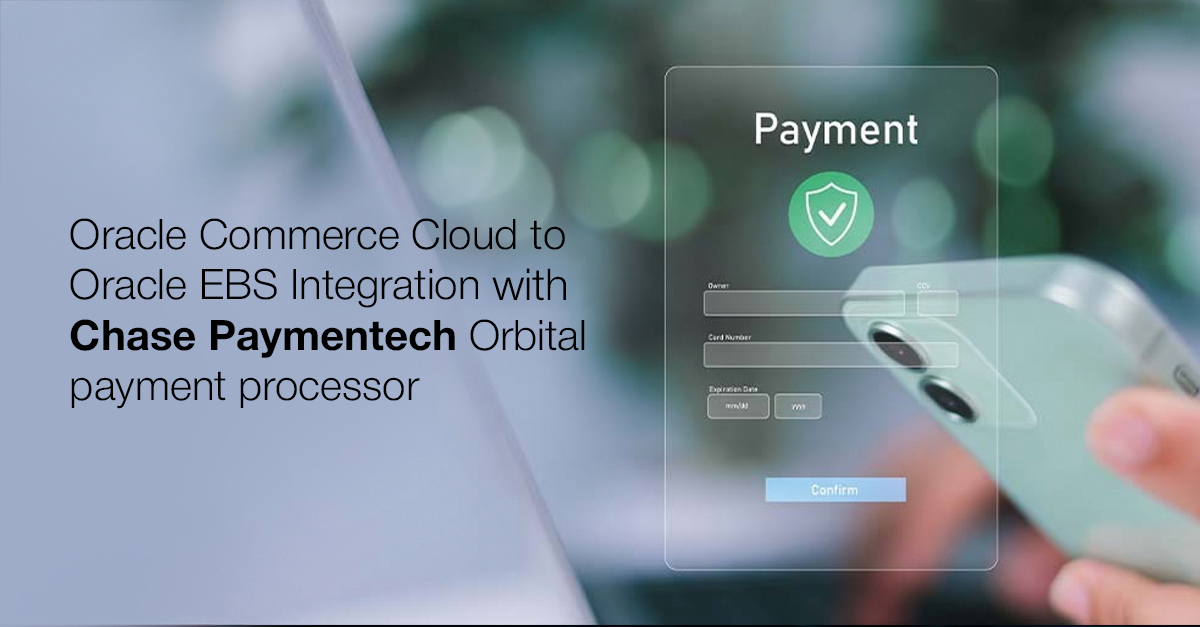Oracle Commerce Cloud to Oracle EBS Integration with Chase Paymentech Orbital payment processor
In today’s digital landscape, ensuring secure and efficient payment processing is critical for businesses handling online transactions. Oracle Commerce Cloud (OCC) and Oracle E-Business Suite (EBS) offer a robust framework for managing credit card payments through a tokenization-based integration. This blog delves into the OCC to EBS payment processing flow, explaining the key steps, benefits, and technical considerations for handling transactions securely and efficiently.
Understanding Tokenization in OCC and EBS
One of the core aspects of this payment processing flow is credit card tokenization, which ensures that sensitive card details are never stored in raw format. Instead, a token (a unique identifier) replaces the card number, making transactions more secure and compliant with data protection regulations such as PCI DSS.
How Tokenization Works in OCC & EBS
- When a customer enters credit card details in OCC, the system generates a token instead of storing the actual card number.
- This token is then stored in OCC’s profile of the logged in user.
- The tokenized card information is securely transmitted to EBS, where it is used for payment processing and order remittance.
- Chase Paymentech API is used to process payments while ensuring security and fraud prevention.
Payment Flow for New Credit Cards
When a user enters a new credit card in OCC, the following steps ensure a seamless transaction experience:
- Customer Input: User enters new credit card details at checkout.
- Decision Point: System checks whether the user wants to save the card for future transactions.
- OIC Endpoint Call: If saving is chosen, an OIC (Oracle Integration Cloud) call is made to create a credit card order.
- Tokenization: The card is tokenized and stored securely in EBS TCA (Trading Community Architecture) Module.
- Transaction Processing: OCC communicates with Chase Paymentech API to initiate payment remittance and receipts.
- Order Completion: The transaction is completed, and the payment token is stored for reference.
Using Saved Credit Cards for Payments
For customers who have already saved their credit card information, the OCC to EBS payment flow is even more streamlined:
- Card Selection: Customers choose a saved card during checkout (only the last four digits are displayed for security).
- Token Retrieval: The token number linked to the saved card is retrieved from the EBS TCA Module.
- Transaction Processing: OCC uses the token to process payments through Chase Paymentech API.
- Payment Completion: The system verifies the transaction, processes the remittance, and finalizes the order.
EBS Credit Card Token Storage & Vaulting
How Tokens Are Managed in EBS
- Every new credit card entry creates an entry in EBS’s payment instrument table.
- The system checks if a matching token already exists to prevent duplication.
- A mod-10 algorithm generates a vault number, which is mapped to the token number.
- When a tokenized card is used for payment, the system retrieves the Instrument ID from the vault to process the payment securely.
Technical Considerations & API Integration
To enable smooth communication between OCC and EBS, the following API endpoints play a crucial role:
- Tokenization API: Generates and manages tokenized card details.
- OIC Endpoint Call: Handles secure data transmission between OCC and EBS.
- Chase Paymentech API: Processes payments while ensuring fraud protection.
- EBS Receivables Concurrent Program: Manages recurring payments using stored tokens.
Why This Integration Matters
- Enhanced Security – Tokenization ensures that sensitive card details are never exposed.
- PCI Compliance – Businesses remain compliant with payment security standards.
- Faster Transactions – Saved tokens reduce checkout friction, improving user experience.
- Seamless Data Flow – API-driven integration ensures smooth transaction processing between OCC and EBS.
The OCC to EBS payment processing flow is a well-structured, secure, and efficient approach to handling online payments. By leveraging credit card tokenization, OIC integration, and secure API calls, businesses can enhance security, improve transaction speed, and ensure compliance with global payment regulations.
Implementing this integration ensures that customers enjoy a smooth and secure checkout experience, while businesses benefit from efficient and secure payment processing.
Click here to learn more about this integration.








There are no comments yet.